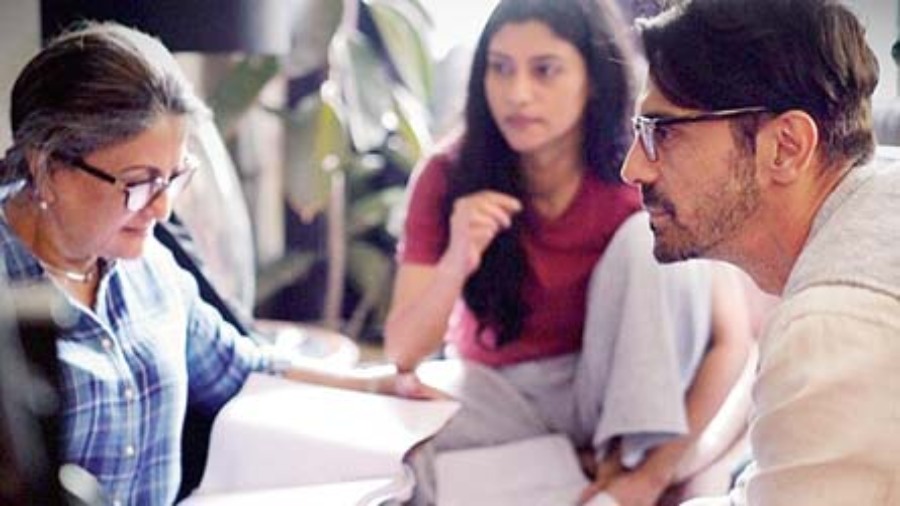The Rapist — an explorative, interrogative look at the act of rape and its repercussions — will be screened at the ongoing Kolkata International Film Festival on May 1. Directed by Aparna Sen and starring daughter Konkona Sensharma, along with Arjun Rampal, Tanmay Dhanania and Anindita Bose, The Rapist, co-produced by Applause Entertainment, premiered under the ‘A Window on Asian Cinema’ section at the 26th Busan International Film Festival in October last year, and jointly won the prestigious Kim Jiseok award. The Telegraph chatted with Konkona on the film, being directed by her mother once again and why she’s excited about the current creative climate.
Your mother lived with the story of The Rapist for a very long time. At what point did you come to know about it?
What happens invariably when my mother has a story simmering within her, she often shares it with me at an early stage. With me, with other loved ones... friends, family, trusted people. So most often, I do get to know about her films in advance, at just the story level. That’s very nice... coming to know of the story early and getting into that world slowly. That has been the usual pattern for us.
Sometimes when she gets inspired, she shares the germ of the story and then it develops further. So it’s never happened that I am reading a script of hers afresh and without any context.
And what were your initial thoughts?
That it’s quite a brave story. It’s a tough subject, you know... to write, to enact, I don’t know how people will react to it. When the script was finally written, it turned out to be something that all of us were very moved by. All of us are deeply affected by these things... it’s just that we don’t know what to do about it. One is constantly bombarded with this kind of news, it affects all of us, and there is no outlet, really.
The Rapist is essentially an investigation, an interrogation into what makes a man commit the crime. The film doesn’t really seek to provide solutions. Rape is not something that happens to only a certain section of society, right? It can happen to a young woman, an older woman, rich or poor... it affects everybody. And we don’t know what to do or even how to process it or even discuss it. It’s very important to understand what really are the circumstances in which it happens, why it happens, how it affects the survivor and her family, how it affects the perpetrator and his family... that’s what the film addresses.
This must not have been an easy part to play. How did you have to prepare yourself psychologically, emotionally and even physically for this role?
At the beginning, I had a lot of discussions with my mother, which made me familiar with the story and the world which it is set in. That was very useful. It also gave me an idea as to where she is coming from. We also did a lot of workshops. Arjun Rampal, Tanmay Dhanania, Anindita Bose and I — all the main actors — were involved in this, and we all had to come to the same page. Everyone may have different ideas about the same thing. Finally, the idea is to align with what the director is trying to say, what the film is trying to say. These workshops really helped with that.
This is an exploration of the act and the psyche of a rapist. What do you want the viewer to take back from the film?
Honestly, I don’t have any specific ideas about how others should think and should feel, in fact I don’t think it’s necessary or even interesting to tell people what to feel about a film. With this film, we have tried to raise some important points and the fact that maybe we all need to think a little deeply about this. No one has been able to stop this crime from happening. Everybody knows it’s wrong, and that’s where it ends. This film is a deeper exploration of what happens beyond the act of rape. There are many questions asked, but there is not one specific answer. If this film makes people think about these things, then I think it’s a great beginning.

Director Aparna Sen (L ) with Konkona Sensharma and Arjun Rampal
What was your reaction when you heard it was going to be called The Rapist? It’s very straightforward, very hard-hitting, has a lot of recall value, but could also be potentially contentious....
It’s an impactful title. We were unable to come up with anything else that could be more impactful. I don’t mind the title. I also think that it’s very straightforward... people who don’t want to watch it don’t have to watch it. This is a difficult subject in many ways. The title doesn’t let you think it’s anything else.
Has being a part of this film changed your worldview in some way?
I take back something from almost every film I do, especially if it’s well written and deals with a potent subject. All films, of course, don’t do that... some of them are very lighthearted and don’t leave you disturbed. All the films that I have done with my mother — Mr and Mrs Iyer, 15 Park Avenue, Goynar Baksho — always leave something within me forever.
In The Rapist, we talk about restorative justice in a small way, which is something I hardly knew about. The film doesn’t advocate restorative justice, but it does have conversations about it, as it does about death penalty and therapy. But it’s not a prescriptive film. It doesn’t tell you what needs to be done.
Do you and your mother, by dint of your relationship and the fact that she’s directed you before, have a shorthand on set?
It helps that we easily understand each other. There is a lot of mutual respect and trust. I know her working style, she knows mine. We each are aware of what the other is comfortable with. We know how the other reacts when stressed... all of that helps on set, you know. Shooting a film is always very intense and difficult. There are long hours, often very difficult circumstances — especially in a film like The Rapist — and so it helps to have a connection and an understanding with the director.
How are the two of you different or similar as film-makers?
I have just directed one film (A Death in the Gunj), so it’s hardly anything! (Laughs) I am now directing two short films. A lot of my film-making, my ideas regarding cinema do come from my mother. I have inherited her aesthetics, and even that of my grandfather’s (Chidananda Dasgupta) and my father (Mukul Sharma). But it’s very difficult to separate strands of influence because they are so intrinsically interwoven. It’s fair to say that I am deeply influenced by her, her aesthetics and her film-making.
Is this your most fulfilling time as an actor, in terms of the opportunity, diversity and variety available?
In many ways, yes. In recent times, I have got some very interesting roles. I have always been lucky enough to get some interesting roles, even early on in my career, but recent work like Dolly Kitty (Aur Woh Chamakte Sitare), The Rapist and Geeli Pucchi (part of the Netflix anthology Ajeeb Daastaans) have really had interesting and unusual roles for women. These are not generic women characters.
